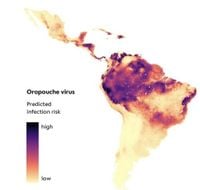The Oropouche Virus, a tropical disease transmitted by various mosquitoes, is proving to be more widespread in Latin America than previously thought. A new study published in The Lancet Infectious Diseases suggests that as many as one in ten residents in some areas may have been infected with the virus, which was first identified in the 1950s.
Researchers from Charité – Universitätsmedizin Berlin have highlighted the alarming prevalence of the Oropouche virus (OROV), which causes symptoms similar to those of dengue and chikungunya fever, including fever, chills, headaches, and muscle aches. The study indicates that the virus is massively under-diagnosed, with at least 6.3% of over 9,400 blood samples from Bolivia, Colombia, Costa Rica, Ecuador, and Peru showing antibodies against the virus. This translates to at least one in 16 people in these regions having contracted the infection at some point in their lives.
Professor Jan Felix Drexler, head of the Virus Epidemiology laboratory at Charité, noted, “Our data shows that Oropouche virus is massively under-diagnosed in Latin America. In some areas, at least one person in ten has experienced a prior infection with the pathogen.” He further emphasized the need for increased awareness and testing, as many cases go unreported due to the lack of diagnostic capabilities in the region.
Since the end of 2023, the number of Oropouche infections has skyrocketed, with reports indicating more than 20,000 cases annually in Latin America. The Brazilian Ministry of Health reported a staggering increase in cases, with 7,653 registered by August 2024, compared to just 831 in 2023. Among these cases were four instances of microcephaly and the deaths of two women aged 21 and 24, both of whom had no pre-existing health conditions.
A new variant of the Oropouche virus, identified in January 2024 in northern Brazil, is believed to be contributing to the current outbreak. This variant, known as Orov_BR-2015-2024, produces 100 times more viruses than the strain isolated in the 1960s within just 48 hours, according to a study published on medRxiv.
Moreover, the Oropouche virus has been linked to severe complications in pregnant women. A report in The New England Journal of Medicine confirmed instances of vertical transmission, where the virus is passed from an infected mother to her child. In Brazil, there have been reports of one stillbirth and a miscarriage in the state of Pernambuco, as well as four cases of newborns with microcephaly in Acre and Pará, potentially attributed to Oropouche infection.
Despite these alarming findings, there is currently no specific treatment or vaccine for the Oropouche virus. The Centers for Disease Control and Prevention (CDC) recommend that pregnant women avoid travel to areas where the virus is prevalent and take precautions such as using insect repellent and sleeping under mosquito nets.
In addition to the health risks posed by the virus, researchers have also indicated potential sexual transmission risks. A study from the University of Brescia in Italy detected the virus in the sperm of a traveler diagnosed with Oropouche fever after an infection in Cuba in July 2024. This finding raises concerns about the virus's transmission routes and necessitates further investigation.
As the Oropouche virus continues to spread, health officials in Germany have reported four cases of Oropouche fever among travelers returning from Latin America, with three cases in 2024 and one in 2025. Although there has been no local transmission observed in Germany, the Robert Koch Institute (RKI) advises travelers to take precautions against mosquito bites, particularly pregnant women who are advised to critically assess the necessity of their travel plans.
In light of the growing number of infections and the potential health risks associated with the Oropouche virus, experts are calling for enhanced public health measures and greater awareness among both healthcare providers and the public. As Drexler stated, “We don’t know how long the antibodies last,” highlighting the uncertainty surrounding immunity and the need for ongoing research into the virus.
The ongoing outbreak and the emergence of new variants underscore the importance of monitoring and controlling mosquito populations, as climatic factors such as rainfall and temperature significantly influence the spread of the virus. Heavy rainfall in parts of South America last year may have contributed to larger mosquito populations and, consequently, the increased transmission of the virus.
In summary, the Oropouche virus represents a growing public health concern in Latin America and beyond. With its potential for severe complications and the lack of effective treatments, it is crucial that governments and health organizations prioritize research, awareness, and prevention strategies to combat this emerging threat.







